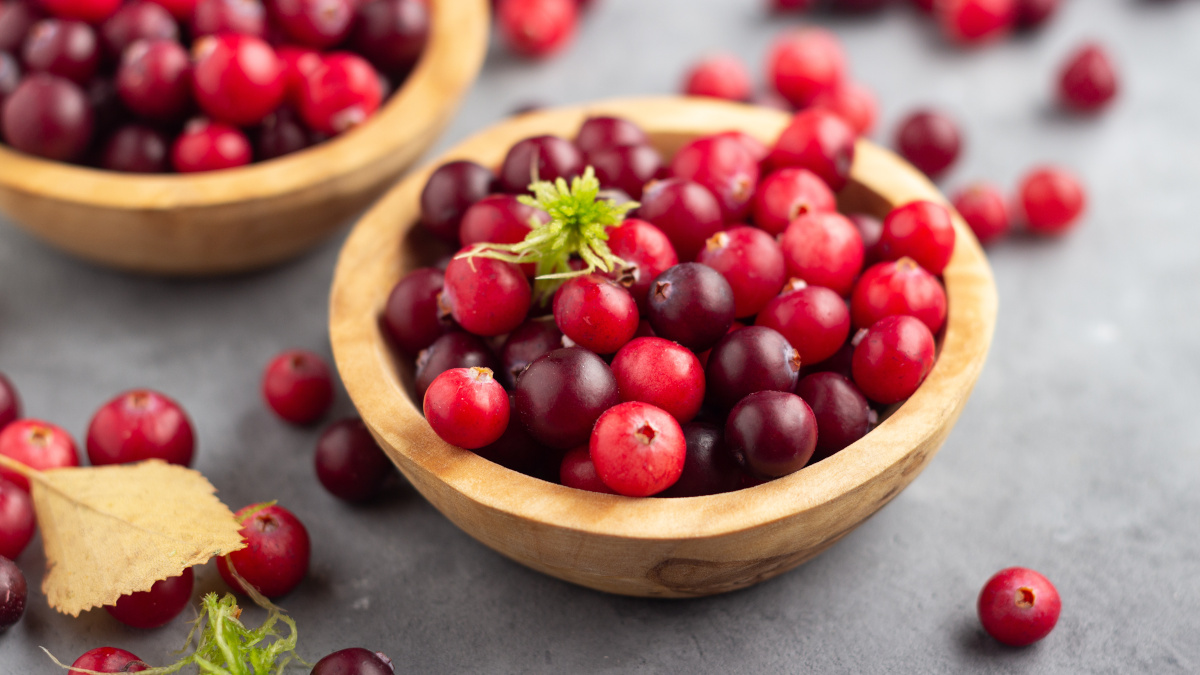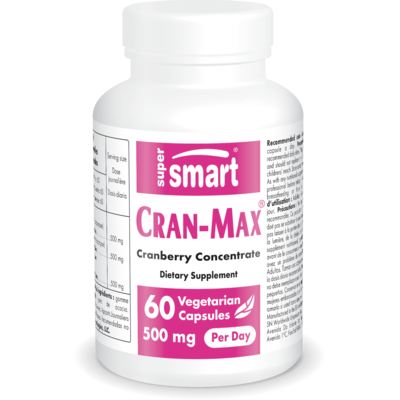
The cranberry in botany
The cranberry (Vaccinium microcarpon) is a perennial plant from the Ericaceae family which also includes the lingonberry and the blueberry. Native to North America, it grows wild in the acid, moist soil of peaty bogs and marshes. Today, it is cultivated on a large scale in the United States(especially Wisconsin and Massachusetts) and Canada, where it is known as ‘atoca’ or ‘atoka’. In France, it is more commonly known as ‘cranberry’ or ‘large North American cranberry’ (1).
Growing to no more than 30cm in height, this evergreen, groundcover shrub is distinct from other species of the genusVaccinium in that it has small, pink, oval, open flowers which bloom in the spring.
These are replaced in autumn by red berries, 2cm in diameter, with a tart, astringent flavor, which are usually consumed in the form of dried fruit, juice or jelly. Extracts of these tiny fruit are also used in the production of dietary supplements.
What health benefits are offered by cranberries?
Cranberries have a remarkable nutritional profile. The fresh berries provide a significant amount of antioxidant vitamin C (100g of raw cranberries provides 12% of our recommended daily intake) and manganese, while also being low in sugar and calories (2). The dried form has more calories, but also more fibre and vitamin E. The fruit also contains various organic acids (including citric, malic and phosphoric acids), pectin, tannin and glucosides (3).
In traditional medicine, cranberries were much prized by Native Americans for treating any condition related to the kidneys, blood and digestive system (4). They were also applied to wounds in the form of poultices or powder for their disinfecting and healing properties. However, the primary indication was for preventing and relieving urinary tract infections (5-6).
When European colonists arrived in the New World, they too came to appreciate cranberries’ many benefits. They were used, in particular, during the ‘Age of Discovery’ to combat scurvy on Atlantic voyages. Cranberry use fell out of favour after the Second World War, with the advent of synthetic antibiotics, and it was only in the early 1960s that this small red berry returned to the forefront of the scientific arena.
It was long thought that cranberries’ effects on the urinary tract were due to their acidifying action on urine. However, a totally different explanation has now been suggested. The cranberry is actually the only fruit to contain specific flavonoids called type A proanthocyanidins, which create an anti-adhesion environment hostile to bacteria (7-8).
Scientists are actively engaged in trying to confirm this theory. The results so far are generally promising. For example, one study has examined the efficacy of cranberry juice compared with a placebo in preventing recurrent urinary tract infections (UTIs) in a cohort of girls aged between 3 and 14 (9).
In a randomised controlled trial, 137 older women suffering from recurrent UTIs were given either 500mg of cranberry extract, or 100mg of a certain antibiotic, for a period of six months. The antibiotic was found to have only a very limited advantage over the cranberry extract in preventing recurrence (25 cases in the cranberry group and 14 in the antibiotic group), and it also had more adverse side-effects (10).
In view of their ‘anti-adhesion’ potential, cranberries are already being considered by the scientific community for other areas of application, including oral hygiene and combatting H. pylori (the most common cause of stomach ulcers) (11-12).
Innovative cranberry capsules
If you’re looking for a tried-and-tested cranberry supplement, the product Cran-Max® contains a cranberry extract supported by various clinical studies, and comes in capsule form (13). In particular, it is standardized to 7.2% type A proanthocyanidins, its most recognized active compound, for maximum efficacy.
It also benefits from the use of patented Bio Shield® technology for slow release of the active principles once they have reached the lower GI tract. This cutting-edge delivery system ensures complete and optimal absorption of the capsules’ precious substances.
LE CONSEIL SuperSmart
References
- Neto CC, Vinson JA. Cranberry. In: Benzie IFF, Wachtel-Galor S, editors. Herbal Medicine: Biomolecular and Clinical Aspects. 2nd edition. Boca Raton (FL): CRC Press/Taylor & Francis; 2011. Chapter 6. Available from: https://www.ncbi.nlm.nih.gov/books/NBK92762/
- Nemzer BV, Al-Taher F, Yashin A, Revelsky I, Yashin Y. Cranberry: Chemical Composition, Antioxidant Activity and Impact on Human Health: Overview. 2022 Feb 23;27(5):1503. doi: 10.3390/molecules27051503. PMID: 35268605; PMCID: PMC8911768.
- Wang Y, Harrington PB, Chen P. Analysis of Phenolic Compositions in Cranberry Dietary Supplements using UHPLC-HRMS. J Food Compost Anal. 2020 Mar;86:103362. doi: 10.1016/j.jfca.2019.103362. Epub 2019 Nov 9. PMID: 32863574; PMCID: PMC7451253.
- Philip N, Walsh LJ. Cranberry Polyphenols: Natural Weapons against Dental Caries. Dent J (Basel). 2019 Mar 1;7(1):20. doi: 10.3390/dj7010020. PMID: 30823634; PMCID: PMC6473364.
- Fu Z, Liska D, Talan D, Chung M. Cranberry Reduces the Risk of Urinary Tract Infection Recurrence in Otherwise Healthy Women: A Systematic Review and Meta-Analysis. J Nutr. 2017 Dec;147(12):2282-2288. doi: 10.3945/jn.117.254961. Epub 2017 Oct 18. PMID: 29046404.
- Xia JY, Yang C, Xu DF, Xia H, Yang LG, Sun GJ. Consumption of cranberry as adjuvant therapy for urinary tract infections in susceptible populations: A systematic review and meta-analysis with trial sequential analysis. PLoS One. 2021 Sep 2;16(9):e0256992. doi: 10.1371/journal.pone.0256992. PMID: 34473789; PMCID: PMC8412316.
- Howell AB, Reed JD, Krueger CG, Winterbottom R, Cunningham DG, Leahy M. A-type cranberry proanthocyanidins and uropathogenic bacterial anti-adhesion activity. 2005 Sep;66(18):2281-91. doi: 10.1016/j.phytochem.2005.05.022. PMID: 16055161.
- Krueger CG, Reed JD, Feliciano RP, Howell AB. Quantifying and characterizing proanthocyanidins in cranberries in relation to urinary tract health. Anal Bioanal Chem. 2013 May;405(13):4385-95. doi: 10.1007/s00216-013-6750-3. Epub 2013 Feb 9. PMID: 23397091.
- Ferrara P, Romaniello L, Vitelli O, Gatto A, Serva M, Cataldi L. Cranberry juice for the prevention of recurrent urinary tract infections: a randomized controlled trial in children. Scand J Urol Nephrol. 2009;43(5):369-72. doi: 10.3109/00365590902936698. PMID: 19921981.
- Bodet C, Grenier D, Chandad F, Ofek I, Steinberg D, Weiss EI. Potential oral health benefits of cranberry. Crit Rev Food Sci Nutr. 2008 Aug;48(7):672-80. doi: 10.1080/10408390701636211. PMID: 18663617.
- Zhang L, Ma J, Pan K, Go VL, Chen J, You WC. Efficacy of cranberry juice on Helicobacter pylori infection: a double-blind, randomized placebo-controlled trial. 2005 Apr;10(2):139-45. doi: 10.1111/j.1523-5378.2005.00301.x. PMID: 15810945.
- Bosmans JE, Beerepoot MA, Prins JM, ter Riet G, Geerlings SE. Cost-effectiveness of cranberries vs antibiotics to prevent urinary tract infections in premenopausal women: a randomized clinical trial. PLoS One. 2014 Apr 4;9(4):e91939. doi: 10.1371/journal.pone.0091939. PMID: 24705418; PMCID: PMC3976255.
1 Days
Solid
Fast, affordable, effective.
Buyer
2 Days
The supplements made an immediate…
The supplements made an immediate impact on my microbiome. I love it.
JOHNSON Stephen
3 Days
SUPERSMART WEIGHT LOSS BOOSTER
SUPERSMART IS A GREAT CO- MPANY, GREAT PRICES,IT'S SO VERY EASY TO GET A HOLD OF AND, I RECEIVED MY ORDER IN SUCH A VERY SHORT TIME,AND BECAUSE OF THAT,I AM ALREADY LOSING WEIGHT! IT'S MAKES FOR A GREAT DAY WHEN I WEIGH MY- SEF AND I FIND OUT THAT I HAVE LOST A COUPLE OF MORE PO- UNDS.I ALSO DO THE "SPEED UP YOUR METABOLISM TRICK",WH- ERE YOU DIET ONE DAY AND ARE OFF THE NEXT,AND YOU DRINK DIET GREEN TEA AND AND EAT "DIET TYPE " OF MEALS.IT DOES HELP.I ALSO TRY TO EAT FOODS THAT "BURN CALORIES" ON "DIET DAYS".
PERFUMO Irene L
4 Days
The package arrived in good condition
The package arrived in good condition. It is too soon to say how effective the S-Acetyl-Glutathione is as I have taken only 1 capsule.
WRIGHT Connie
6 Days
Great people
Great people, friendly, helpful and competent!
WHITEHILL Claude Steven
8 Days
Ease of ordering and customer service.
Ease of ordering and customer service.
CARTER Rhonda
13 Days
Good product
Good product, value and price. Arrived ahead of promise.
El Capt
15 Days
Excellent products
Excellent products. High quality and outstanding customer service! Thank you!
BUISSON Laurence
17 Days
Very quick shipping and…
Very quick shipping and deliveries.Customer service is also quite efficient.
Norman
26 Days
Fast shipping
Fast shipping, fair prices.
Yelgnit
26 Days
ABOVE & BEYOND
Great product, received in a timely manner…thank you
DOMINIC
27 Days
BUYING IN SUPER SMART IN U.S.
There were some problems buying a subsidiary in the U.S., but in the end, I did it!
MENDEZ TELLEZ GIRON Jose
27 Days
Amazing products
Amazing products ! I recommend 100%
BLASIAK Pierre
29 Days
They have what I need
I was able to buy a supplement that is very difficult to find in US, so it makes me happy! The website is easy to navigate. Fast and free shipping (over $25)
Eva
33 Days
Good all around service with a few…
Good all around service with a few hiccoughs.
PODLAHA Helmut




